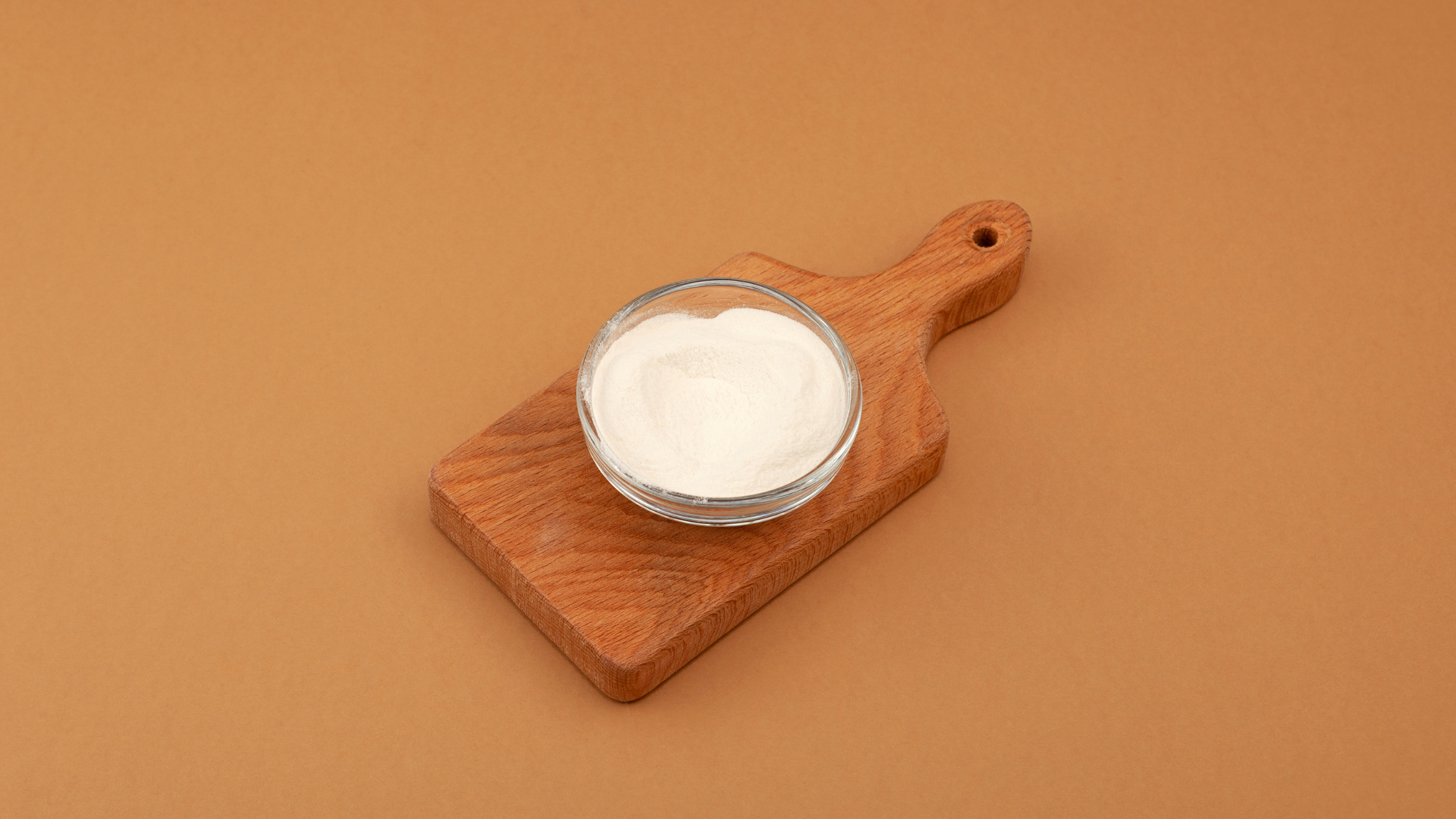Is Guar Gum Bad For Gut Health?
Have you heard of guar gum? It’s a type of soluble fiber that tends to come with a bit of controversy. If you have heard of it, betting there’s a good chance you’ve heard that it’s an ingredient to steer clear of. Or that guar gum is really bad for your gut health. But what’s the truth? As a dietitian and expert in gut health, I’m asked about guar gum all the time so let’s get into it.
What is soluble fiber?
As the name suggests, a soluble fiber is one that dissolves in fluid. When this happens, the fiber expands and forms a gel (and if we’re talking about eating foods that contain soluble fiber, then that gel is formed in our gut). Guar gum (or guar fiber, or partially hydrolyzed guar gum/fiber) is one type of soluble fiber (more on where guar gum comes from later). Other foods that are rich in soluble fiber include:
Veggies: Onions, garlic, artichokes, corn, potatoes (cooked then cooled), konjac (a starchy root veggie that you can often found sold as noodles)
Fruits: Blackberries, figs, mango, passionfruit, avocado, most citrus, cantaloupe, strawberries, kiwi, firm bananas
Grains: Wheat, rye, rice (cooked then cooled), millet, spelt, oats
Beans/legumes: Black beans, tofu, lentils, chickpeas, tempeh
Other: Psyllium husk (another popular fiber supplement)
Out of the 25-35 grams of fiber most of us need each day, it’s recommended that we eat at least 5-10 grams of soluble fiber per day (sometimes I a recommend eating little bit more than that for those with high cholesterol and/or blood sugar).
This is because soluble fiber is so good for us! The gel it forms partially absorbs glucose and fat in our blood, which decreases how well we absorb them after we eat. This ultimately helps to lower blood sugar, cholesterol, and blood pressure! Also, like all fibers, soluble fiber helps to slow digestion which helps promote better satiety and more clear fullness signals. Eating enough fiber in general is also associated with a lower risk of cancer as well as improved gut health and function (which I’ll talk more about next).
What is guar gum?
Guar pods from the guar plant.
Guar gum (or guar fiber, or partially hydrolyzed guar gum/fiber) is a type of soluble fiber that comes from the seeds of the guar plant found in Pakistan and India. It’s often used in gluten-free foods as a thickening or binding agent because it forms a gel-like substance when it comes in contact with fluid.
Besides its role in the food industry, people have been using guar gum for a lot of different reasons for many years. So this isn’t a “fad” ingredient or product. Some of these uses include:
Treating constipation/diarrhea and IBS in general
Lowering high cholesterol and high blood pressure
Controlling diabetes and high blood sugar
Weight loss
Treating SIBO, or small intestinal bacterial growth
Treating cholestasis (or when the bile flow from the liver is impacted)
How does guar gum impact gut health?
First off, I’m probably not going to say what you’re expecting, so keep an open mind. Guar gum is not bad or harmful for your gut! Quite the opposite, in fact! Here’s how it benefits our gut function and overall gut health:
Guar gum promotes better regularity.
Remember that because guar fiber is a soluble fiber, it forms a gel in our gut. This generally helps to stimulate the movement of stool and waste through our gut. In addition to normalizing transit time, this gel is really helpful for promoting better bowel movements - no matter if you experience constipation, diarrhea or loose stools, or a combo of the two. For stools that are hard or pebbly, hard to pass, or backed up, the gel helps to lubricate them and add some “gelly” bulk that brings those tiny hard pieces together and makes everything easier to pass through. On the other side of things, it helps looser stools by soaking up that excess fluid which leads to more formed (and a little slower and less frequent!) poops. Outside of its action on our intestines, guar fiber has been shown to slow the movement of contents out of our stomach as well as increase the viscosity or thickness of those contents. This helps us to feel more satiated and have more lasting fullness after eating, and for some it can help reduce uncomfortable post-meal symptoms (especially for those who find themselves rushing to the bathroom right after eating).
Guar gum is a prebiotic.
Prebiotics are specific compounds in foods (typically high fiber foods) that act as “food” for the beneficial microorganisms in our gut. When these microorganisms “eat” prebiotics, what’s really happening is they are fermenting these compounds and the resulting products are metabolites called short-chain fatty acids (SCFA). You may see these referred to as postbiotics as well. SCFA are incredibly important for not only our gut function, but our body’s overall function and health. When we think about probiotics and prebiotics having a benefit in our body, we’re really referring to the SCFA that are produced. So what do SCFA do?
Support our immune system by:
Reducing gut inflammation
Stopping the growth of pathogens in our gut
Regulating immune cells
And more
Provide energy for the cells lining our colon (aka colonocytes)
Have anti-tumor and anti-inflammatory effects
Enhance our intestine’s barrier function
Improve gut muscle contractions and transit time (aka help move stuff through our gut at a normal speed and help with BM regularity)
Benefit our metabolism by reducing cholesterol production and improving insulin sensitivity and overall glucose balance
Signal for satiety hormones to release after eating
Improve water absorption
Guar gum may positively alter the gut microbiota.
One study gave a group of people with IBS-D either a guar gum supplement or a placebo, and then compared their microbiota composition after supplementing for three months. They found that the group who took guar fiber not only had improved symptoms, but their gut profiles also showed an increased abundance of Bifidobacterium, Ruminococcus, and Megasphaera, and a decreased amount 9f while Bacteroides and Phascolarctobacterium were significantly reduced in the PHGG group. This matters because some of the strains that increased have been shown to help treat diarrhea, while those that decreased have been associated with diarrheal disease. So in other words, this study showed that when participants took guar fiber chronically, it lead to improved symptoms and a gut microbiota profile consistent with stool normalization.
Another study showed that taking 6 grams of guar fiber per day increased the population of SCFA-producing bacteria after only two weeks.
What is the research on guar gum and gut health?
First off, guar gum is Generally Recognized as Safe (GRAS) by the FDA as a food additive (phew!). So let’s put to bed all of those fear-mongering TikToks we see of so-called “nutrition experts” picking apart nutrition labels in the store without any good evidence to back it up. Now that that’s out of the way, let’s look at the specific research for what experts say about guar gum and digestive health.
Guar gum is recognized as possibly effective in the research in treating constipation by bulking and softening stool, and as such, increasing output (aka, you go more often). Other research showed that taking 5 milligrams of guar gum daily for four weeks significantly increased the colonic transit time (aka how long it takes for your food to pass through your large intestine) and frequency of bowel movements in patients with chronic constipation and slow transit times. These are just two studies out of many showing the same benefits.
Guar gum is also well-studied as having a positive effect on diarrhea. One study showed that taking 5 grams per day of a specific guar gum (Sunfiber, which is what we like to use in our practice) was more successful in helping symptoms of IBS-D (diarrhea-predominant IBS) than was taking 30 grams of wheat bran per day (although both were helpful).
In regards to IBS in general, guar gum has been shown in research to reduce abdominal pain and overall quality of life, including psychological distress. Although the latter study only showed improvements in the short-term, it still provides promising benefits that warrant further research. If you suffer from any digestive health issues, you know how much your symptoms can affect your day-to-day quality of life. Your nausea, bloating, pain, or distention might affect your appetite, ability to exercise, or desire to even put on clothes and leave the house. And speaking of leaving the house, chronic diarrhea can leave you feeling chained to the bathroom for most of the day if not all of it. To find something that would really help someone’s symptoms and is also well-researched might really change someone’s life. So this research on one simple type of fiber is really exciting.
There’s less convincing research on how effective guar gum is in treating SIBO (again, it’s the condition when bacteria from the large intestine inappropriately invades the small intestine). However, some research shows that taking guar gum alongside the typically prescribed antibiotic rifaximin slightly increases the chance of SIBO eradication versus taking the antibiotic alone.
Should I avoid guar gum?
In my opinion, most of the research on guar gum’s positive impact on gut function and gut health is pretty convincing. And since guar gum is GRAS, there doesn’t seem to be any safety concerns with taking it. Every body tolerates things differently, and some adverse effects like abdominal cramping and pain, diarrhea, gas, heart burn, and loose stools have been reported with varying amounts o0f guar gum consumption. If you are interested in trying guar gum, a good rule of thumb is to start with a small amount and increase as tolerated. As with any fiber supplement, it is so important to make sure you drink at least 8 ounces (1 cup) of water to make sure it doesn’t form that gel in your throat or intestines and create a blockage. It’s also important to space it at least 2 hours away from any medications you take as it could impact how well you absorb those meds. But, as I always say, check with your doc when adding new supplements to your diet.
What do you think? Have you tried guar gum and found relief? Let me know!
Special thanks to the Natural Medicines Database for providing much of this research and for being a generally awesome place for peer-reviewed research on nutrition topics.
As with all blog posts from Real Good Nutrition, this blog post is purely educational. It is not intended to diagnose, treat, cure, or prevent any disease or other conditions, symptoms, or ailments.


